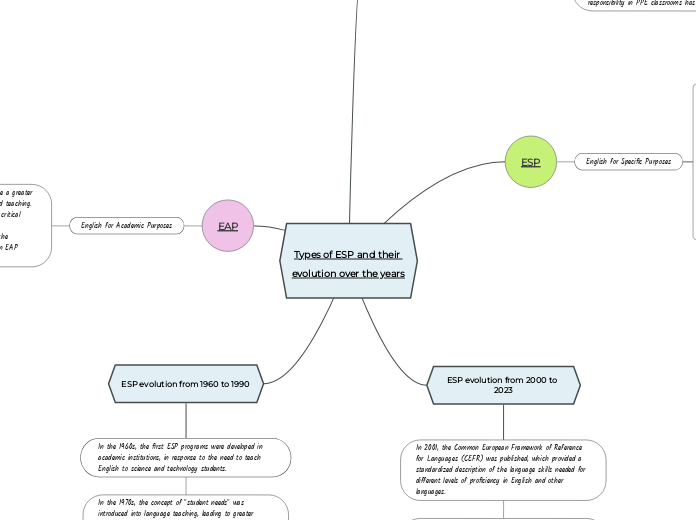Types of ESP and their evolution over the years
EPP
English for Professional Purposes
In recent years, EPP has evolved to include a greater focus on teaching intercultural and intercultural communication skills. More attention has also been paid to teaching leadership and management skills, as well as teaching digital and information technology skills. In addition, the importance of sustainability and social responsibility in PPE classrooms has been emphasized.
ESP
English for Specific Purposes
In recent years, ESP has evolved to include a greater focus on teaching lingua franca communication skills for international and global situations. More attention has also been paid to teaching cultural competence and intercultural interaction skills, as well as teaching digital and information technology skills. In addition, the importance of inclusion and equity in ESP classrooms has been emphasized.
ELT - English Language Teaching and its relationship with the ESP
The ELT and the ESP are closely related as they both focus on teaching the English language. While the ELT focuses on the general teaching of English as a foreign language, the ESP focuses on teaching English for specific and field-specific purposes.
The ELT and ESP share many common skills and objectives, such as teaching language skills, listening comprehension, reading, writing and speaking. However, while the ELT focuses on teaching general language skills, the ESP focuses on teaching specific language skills and techniques related to a specific field.
For example, the ESP may focus on teaching English for Academic Purposes (EAP), English for Professional Purposes (EPP), or English for Specific Purposes, such as teaching English in engineering or medicine. In short, ELT focuses on teaching English in general, while ESP focuses on teaching English for specific and technical purposes in a particular field.
ESP evolution from 2000 to 2023
In 2001, the Common European Framework of Reference for Languages (CEFR) was published, which provided a standardized description of the language skills needed for different levels of proficiency in English and other languages.
In 2005, the International Association of Teachers of English for Specific Purposes (IATEFL ESP SIG) was founded, providing a network for ESP professionals worldwide.
In 2010, the concept of "communicative competence" was introduced in ESP teaching, which focuses on the effective use of language in real situations.
In 2014, the Common Framework for Teacher Digital Competence was established, which promotes the development of digital skills for language teaching, including ESP.
In 2020, the COVID-19 pandemic accelerated the adoption of online learning technologies for language teaching, leading to further integration of technology in ESP teaching.
In 2023, artificial intelligence and machine learning are expected to play an increasingly important role in language teaching, including ESP, by enabling greater personalization of learning and adaptation to the individual needs of students.
EAP
English for Academic Purposes
In recent years, the EAP has evolved to include a greater focus on the use of technology for learning and teaching. More attention has also been paid to teaching critical thinking and critical skills, as well as teaching collaboration and teamwork skills. In addition, the importance of cultural and linguistic diversity in EAP classrooms has been emphasized.
ESP evolution from 1960 to 1990
In the 1960s, the first ESP programs were developed in academic institutions, in response to the need to teach English to science and technology students.
In the 1970s, the concept of "student needs" was introduced into language teaching, leading to greater personalization of learning and the creation of ESP courses for more specialized fields such as medicine and law.
In the 1980s, new pedagogical approaches to teaching ESP were developed, such as the genre approach and the task approach, which emphasize communication in authentic situations.
In the 1990s, technology began to transform ESP teaching and learning, with the introduction of language learning software and the creation of online courses.
